For someone who survived both cancer and the housing crash in 2008, it’s pretty remarkable to hear Sean Bishop say the last two years have been his hardest as a business owner.
“I’m a big believer in buying equipment that reduces wear and tear on bodies,”
Sean says. “We’ve been using Walker Mowers for 18 years now.”
As uncertain as things were in 2008, nothing compares to right now. Sean never knows when or if he can get equipment and parts, materials and supplies, and most importantly, employees to operate his growing business.
“The last couple of years have felt like we’re in a war,” says Sean, owner of Ground Effects Landscaping in Carver, Massachusetts. “Every day feels like we’re going into battle just to function.”
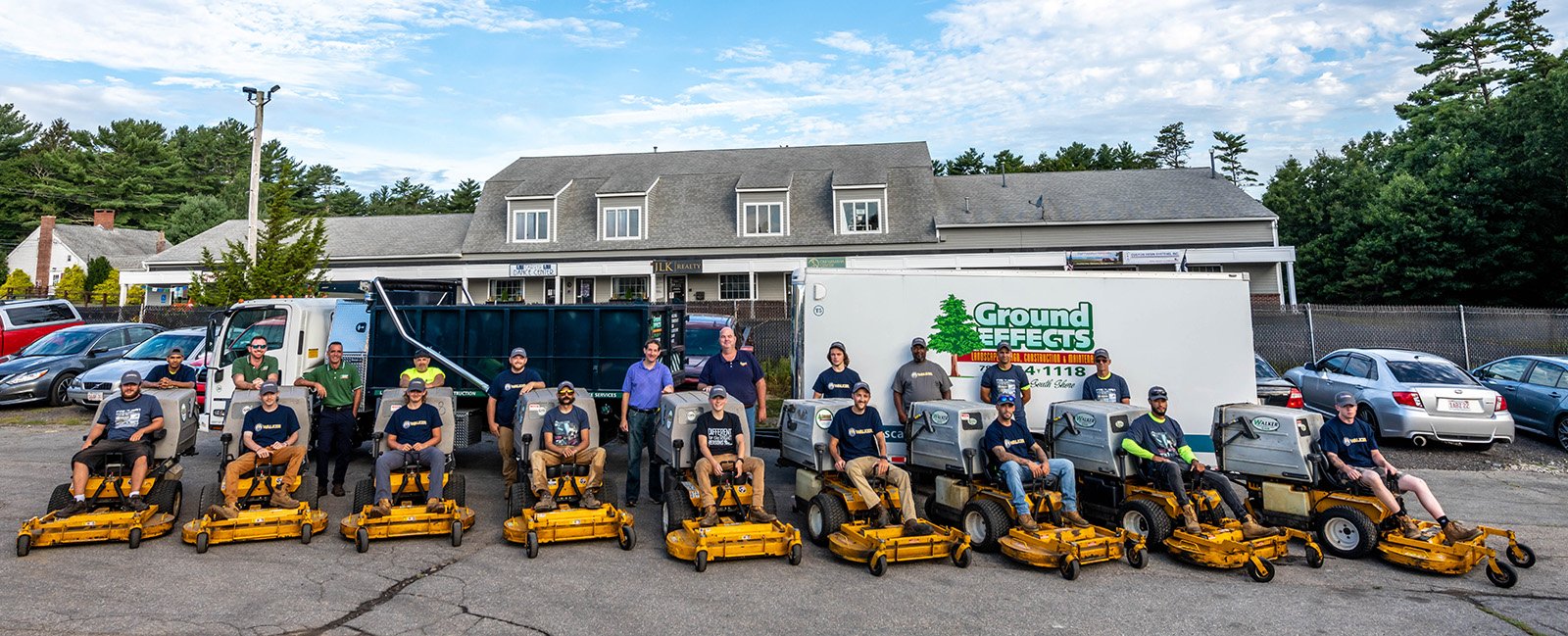
Ground Effects Landscaping’s mower fleet includes a dozen Walkers,
nine of which are shown here. Each unit has a GHS system, 48-inch deck and 23-hp Kohler engine.
Sean hits the battlefield with 35 employees who install plants and hardscaping, fertilize and mow lawns, take care of trees and shrubs, clean up leaves and push snow. Ground Effects also operates a retail business where it sells pavers, mulch and other landscaping supplies to homeowners and other landscape contractors.
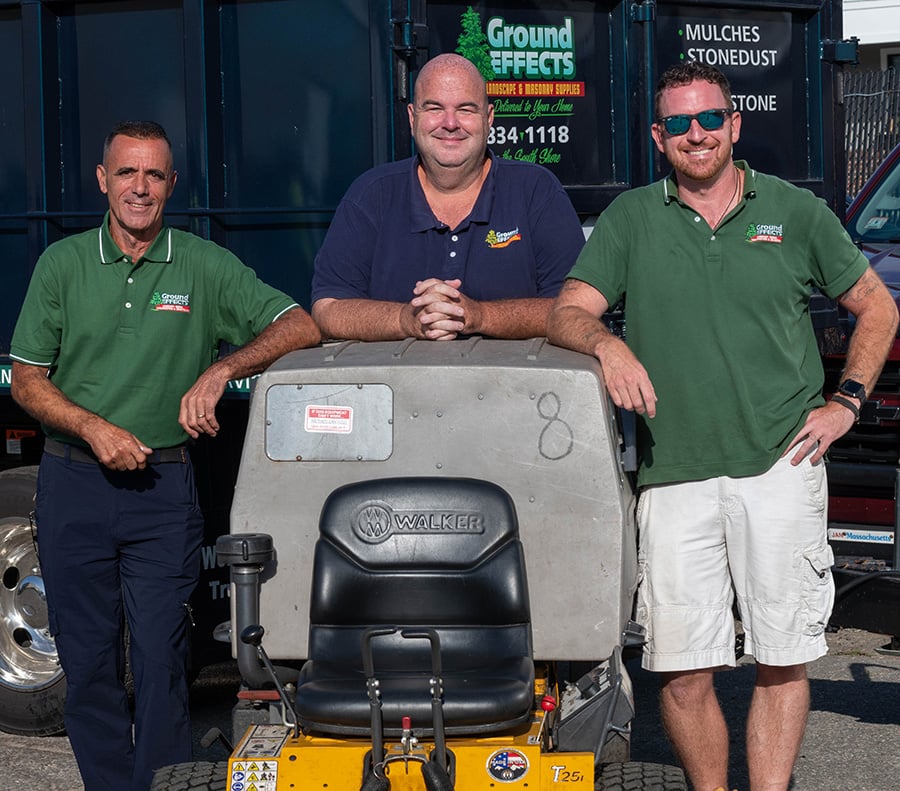
From left: John Alves, maintenance manager, who has been with Ground Effects for five years;
company owner, Sean Bishop; and Luke Hawkins, maintenance operations manager and salesperson,
who has been with the company for 19 years.
“Honestly, we could use 50 employees right now, but we just can’t find them,” Sean relates. “We are actually more fortunate than a lot of my competitors. We at least have a baseline employment level of key people who’ve been with us a while and are outstanding. But the labor market is extremely challenging. At the same time, demand has been at a level I have never seen. At one point last spring, we had a three-month backlog just for appointments. By August, we were booking construction work into this year. Our six maintenance crews have been fully tapped, too.”
Sean is very contemplative about business, reflecting on Wall Street Journal articles he has read and lessons his grandfather once taught him. Sean ponders the current state of supply and demand in the landscaping industry.
“I think there is a tremendous opportunity for this industry right now,” Sean says. “We have to change the way we think as business owners. The most valuable asset you have is the people who work in your company. I don’t care how many customers you have or trucks you own. If you don’t have employees with the right skills and work ethic, the rest doesn’t matter. The landscaping industry is now competing against every other industry for workers. Around here, kids bagging groceries are making $15 an hour. Do you really think you’ll find someone to bust their butt in landscaping for $15 an hour? It’s not going to happen.”
As Sean points out, if companies like Ground Effects Landscaping are going to survive and thrive, owner mindset must change from “wanting to be the lowest bidder” to “paying employees a good wage and charging prices accordingly.”
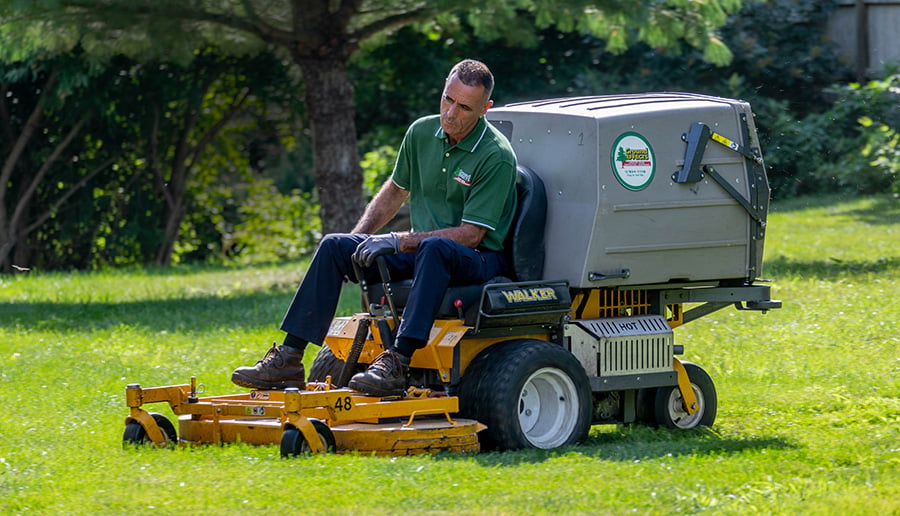
Ground Effects Landscaping has been running Walker Mowers for 18 years.
“I realize there are limits to that,” Sean adds. “As an owner, I’m the monkey in the middle who has to take care of my employees and then try to pass it along to the customer. Most of our customers appreciate the fact that I have good employees who come back year after year. I’ve had customers tell me my employees know their homes better than they do. There is value to that.”
“I NEVER HAD A PROBLEM WITH WORK”
Sean Bishop was the typical neighborhood kid who mowed lawns and shoveled snow to make a few bucks.
“My dad told me at a young age that his job was to provide a house for me to live in, food on the table, clothes for me to wear, and to make sure I got an education,” Sean tells. “Dad also told me that if I wanted money for something like a new bike, I should get a job. So I did. I never had a problem with work.”
That childhood lesson of being rewarded for hard work has always stuck with Sean. It’s a big reason why he reveres “the workforce” as much as he does.
At the age of 15, Sean started to develop an interest in construction. He told his high school guidance counselor that a career in landscape architecture sounded interesting. The counselor didn’t know much about that profession, however, so he directed Sean to a landscape architect who worked at a local nursery. Sean met with the gentleman and ended up with a job in the nursery for the summer.
“I made $6.50 an hour and worked 60 hours a week sometimes,” Sean recalls. “My friends were lucky to find jobs that gave them 10 hours a week. I had a pocketful of money and thought I was Rockefeller.”
More importantly, Sean enjoyed what he was doing to earn that money. He primarily served as gopher around the nursery, but occasionally helped out the nursery’s landscaping crew on different jobsites. It soon became clear to Sean that he not only wanted a career where he could design landscapes, but also build and maintain them.
After earning his bachelor’s degree in landscape architecture and urban horticulture from the University of Rhode Island, Sean started his landscaping company in 1995. He was a one-man band for the first few years until the business started to grow. Ground Effects Landscaping now employs roughly three dozen and has become a leading landscape services provider on the South Shore of Massachusetts.
IT’S THE LITTLE THINGS THAT GO A LONG WAY
Sean’s education and work ethic put him in a natural position to succeed as a landscape contractor. But it was lessons from his grandfather that gave Sean a unique advantage.
“My grandfather was also an entrepreneur,” Sean tells. “He told me to make sure I took some business classes in college because mastering a craft and running a business are two different things. My grandfather also taught me about the importance of engaging employees and sharing success with them. I’ve always tried to remember that.”
Company culture plays an influential role in recruiting and retaining employees, especially when there are fewer to recruit and retain. Ground Effects Landscaping has been putting the foundational blocks in place for several years. The company offers a premium wage, health and dental insurance, paid vacation and other core benefits. In addition, Sean says all of those “little things” a company does to make employees feel appreciated can make a difference.
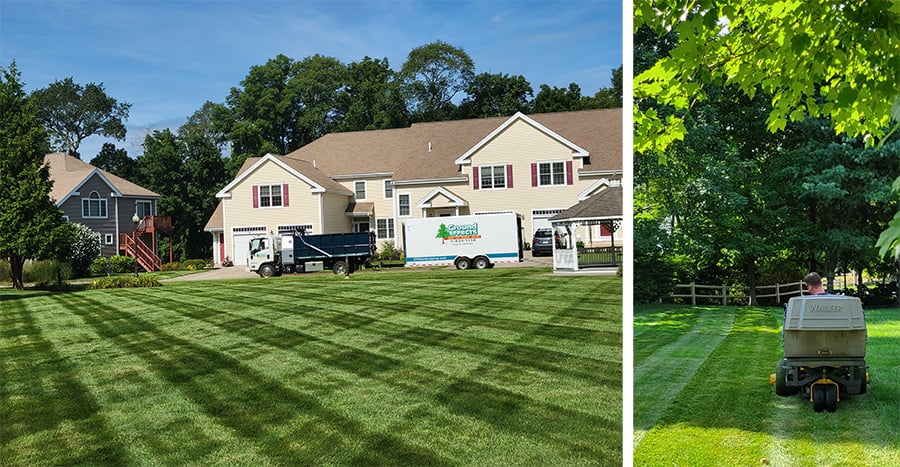
The Walker Mowers collect grass clippings all season long. Bagging is a necessity due to the lush turf Ground Effects lawn care technicians nurture. They’ve begun using a unique bluegrass that grows significantly deeper roots. In combination with a nutrient-rich compost topdressing, Sean Bishop says “It’s like putting grass on steroids.
“We try to thank our employees every day for the work they did,” Sean says. “We also bring everyone back to the shop early once in a while and throw some burgers and dogs on the grill. We have ice cream Wednesdays and our office staff makes sure the fridge is always full of popsicles. As an employer, I am trying to do more of these things because I think they matter.”
For Sean Bishop, what matters most is helping to elevate the perception of a career in the landscaping industry. He is heavily involved with both the Cape Cod Landscape Association and National Association of Landscape Professionals, working on various committees to help advance workforce development initiatives in the industry.
“I remember attending a meeting of Cape Cod landscape company owners and builders,” Sean tells. “I asked everyone in attendance, ‘How many of us pay our employees a wage that would allow them to live right here on the Cape?’ Not too many hands went up, yet we want our people to have the skills, experience and professionalism to work in a high-end market like Cape Cod. It just doesn’t make sense.”
To some landscape company owners, paying a premium wage doesn’t make financial sense. To Sean Bishop, it makes 100% common sense. Investing in employees is as important as investing in good equipment. The two go hand-in-hand.
“I’m a big believer in buying equipment that reduces wear and tear on bodies,” Sean says. “We’ve been using Walker Mowers for 18 years now. I was hesitant to buy one at first because of the price, but now we don’t run anything else, aside from a stand-on mower we use to cut an open field where cut quality isn’t as important. The Walkers are so efficient and easy to operate. The cut quality is unmatched. For the high-end residential properties and condo complexes we maintain, I can’t imagine making my guys use anything else. We bag grass all season and vacuum up leaves in the early fall before having to switch to a vacuum truck.
“What I like most about Walker is all of those little things they’ve done over the years to continue making their machines better,” Sean continues. “Things like increasing the catcher box capacity and making the screen easier to keep clean. You can never stop making a great product even better.”
After 26 years in business, Sean Bishop recently reached an important milestone. He and his wife, Leanne, purchased the property the company had been renting for the past few years. Owning his company’s facility had always been a dream of Sean’s. Now it is a dream come true, and something of which Sean is very proud.
“I want my employees to feel proud too, because this building is just as much theirs,” Sean says. “There is no way we could have done this on our own.”
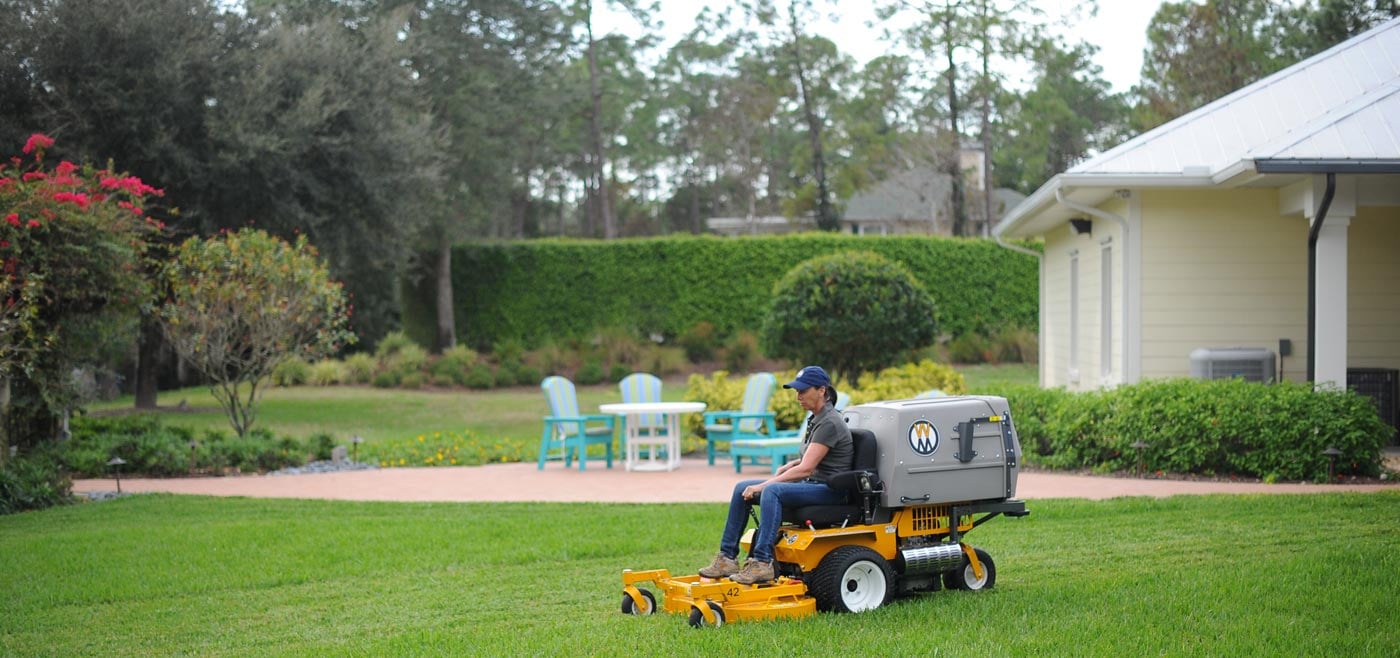

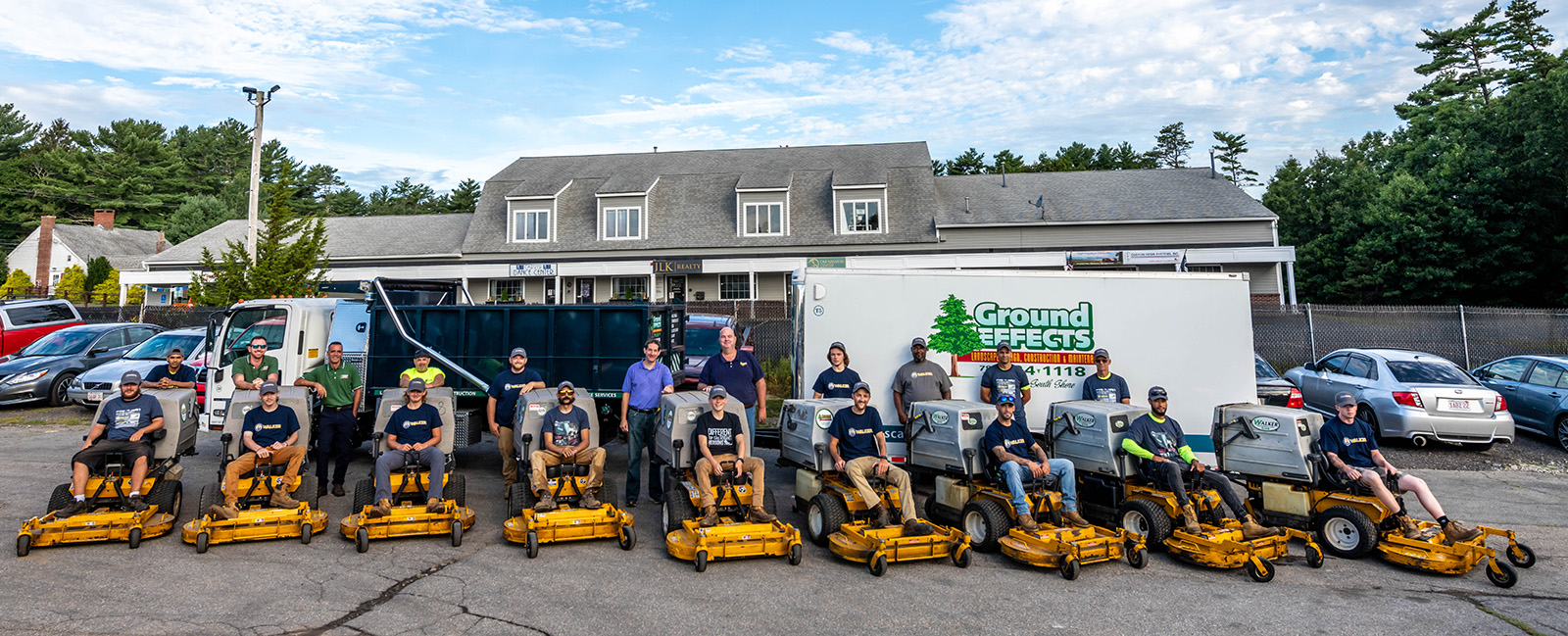


 Site Search
Site Search



